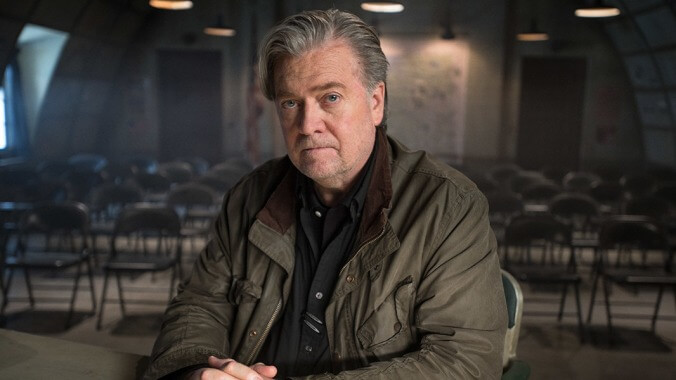If you see just one Steve Bannon doc, make it Errol Morris’ deceptively polite American Dharma

If Michael Moore is the Spielberg of documentary filmmaking—a showman whose name and face virtually everyone recognizes—Errol Morris is the Scorsese. (For the purposes of this comparison, let’s ignore Scorsese’s own nonfiction work, which is extensive but comparatively obscure.) Morris’ films don’t necessarily make a ton of money, but they’re virtually always critical favorites and major cinematic events, whether he’s talking to historical figures (Stephen Hawking in A Brief History Of Time, Robert S. McNamara in The Fog Of War) or little-known eccentrics (as in Gates Of Heaven and Fast, Cheap & Out Of Control). By documentary standards, he’s a superstar, and his movies always get a theatrical release. Yet his latest effort, American Dharma, spent nearly a full year seeking a U.S. distributor, which frustrated Morris so badly that at one point he snippily tweeted, “Fuck ’em. I will distribute the movie myself.” (It finally got picked up by Utopia, a tiny new outfit that’s surely looking to boost its profile.) What made this particular project so toxic? Simple: American Dharma is a fundamentally cordial conversation with Steve Bannon.
It’s not as if Morris hasn’t interviewed controversial political figures before, with wildly varying results. The Fog Of War, in which former Defense Secretary McNamara candidly discusses his role in America’s prolonged Vietnam debacle, took home an Oscar, while its spiritual successor, The Unknown Known, saw Morris get expertly deflected by McNamara’s own successor (several administrations removed), Donald Rumsfeld. But Morris spoke to both of those men years after the events that had made people despise them—many years after, in McNamara’s case. Bannon may be gone from the White House, but nobody has forgotten that he was Trump’s campaign manager and senior adviser, and he remains a significant right-wing presence (as seen in another, lesser documentary released earlier this year, The Brink). Reviews of American Dharma out of Venice last year were decidedly mixed, with many critics complaining that Morris goes far too easy on Bannon, failing to hit him with tough, probing questions. They presumably wanted something along the lines of Isaac Chotiner’s politely relentless New Yorker interviews.
That’s not how Morris works, though. He’s a “more flies with honey” kind of guy—someone who genuinely seeks to understand whoever he’s talking to, rather than be confrontational for its own sake. It’s the journalistic equivalent of Muhammad Ali’s rope-a-dope strategy, and while Bannon is far too media-savvy to be one of Morris’ best subjects, he doesn’t clamp down tight, the way Rumsfeld did. In part, that’s because Bannon (who has directed and produced numerous documentaries of his own, none of them especially well regarded) admires Morris and is clearly flattered to be the star of one of his movies. That deference makes him chatty, and Morris lets him articulate his anti-globalist, ostensibly populist worldview at length, occasionally interjecting (“Come on,” he objects when Bannon claims that Trump wrote his own inaugural speech) but mostly just steering him toward crucial topics, like Charlottesville. Rebuttals arrive in the form of news footage or headlines that frequently contradict whatever Bannon has just said. Morris doesn’t allow blatant lies to go unchallenged, but he also wisely avoids putting Bannon on the defensive.
Furthermore, Errol Morris, unlike most documentarians, is as much stylist as journalist. Because Bannon loves to talk about the 1949 war movie Twelve O’Clock High (starring Gregory Peck), Morris conducts the entire interview inside a reconstruction of one of the Quonset huts seen in that film, decked out with lookalike props. He also has Bannon re-enact notable moments from it, often shooting him in extreme slow motion. No doubt Bannon felt he was being properly romanticized, but Morris uses these absurdly heightened interludes to undermine Bannon’s sense of self-importance, and eventually to suggest the inherent danger of a philosophy founded primarily upon ancient Hollywood ideals of masculinity. It’s done subtly enough that Bannon apparently didn’t feel betrayed (he showed up in Venice, albeit on his own dime to further his own agenda, and has never publicly disowned the film), but virtually every shot in American Dharma serves as implicit visual counterpoint to its subject’s words. By chance, the area where Morris built the Quonset hut was near the remains of a set that had been constructed for one of the movies about the Boston Marathon bombing (probably Patriots Day), and Morris talked Bannon into walking past its fake buildings, shooting him from an angle that emphasizes that they’re just fronts propped up with plywood. He then accompanies that footage with the audio of Trump’s infamous “American carnage” speech, which Bannon reportedly cowrote (with Stephen Miller). Not that subtle at all, actually, and far more effective than just telling the guy that he’s full of shit.